A white police officer in South Carolina was charged with murder Tuesday after a grisly video emerged showing him repeatedly shoot an apparently unarmed black man who was running away, sparking an outraged reaction from local residents, advocates and officials, and a promise that the local police department supply officers with body cameras.
In the April 4 footage captured by a bystander, and posted below, North Charleston police officer Michael Thomas Slager, 33 is seen firing eight shots at a man identified by authorities as Walter Scott, 50. The officer claimed he feared for his life after Scott took his stun gun during a confrontation following a traffic stop over a broken taillight, according to police documents cited by the New York Times.
Slager was booked on the murder charge Tuesday by the Charleston County Sheriff’s Office, shortly after the video emerged, and he was fired.
“When you’re wrong, you’re wrong,” Mayor Keith Summey said of the decision to charge the officer, in an early evening news conference, The Post and Courier reports. “When you make a bad decision, don’t care if you’re behind the shield or a citizen on the street, you have to live with that decision.”
On Wednesday, Summey announced that he had a grant to purchase 101 body cameras for the city’s police force but that he had decided to purchase additional cameras as well.
The South Carolina Law Enforcement Division (SLED) is investigating the shooting, as will the Federal Bureau of Investigation, according to a spokeswoman for the Justice Department.
On Wednesday morning, protesters raising signs and wearing “Black Lives Matter” T-shirts flocked to the North Charleston’s City Hall to slam what they saw as violence in law enforcement, in an echo of similar protests following the police shooting deaths of Michael Brown in Ferguson, Mo. and Eric Garner in New York City.
The graphic video footage of Scott’s death, originally reported by The Post and Courier and the Times, also prompted a strong reaction from South Carolina Sen. Tim Scott, who called it “senseless” on Twitter and said Scott’s death was “absolutely unnecessary and avoidable.” He added that he will be “watching this case closely.”
MORE: South Carolina Police Shooting Renews Calls for Body Cameras
At the beginning of the video showing the shooting, Scott can be seen running from Slager, who rapidly fires seven shots. Following a slight pause, the officer fires an eighth, after which Scott falls to the ground. The officer is then heard yelling, “Put your hands behind your back!” before handcuffing Scott, who is lying face-down on the ground.
The officer is then shown running several yards away and appears to bend down and lift an object from the ground as another officer arrives on the scene. The second officer then requests that “someone grab [him] a kit” over his radio as he approaches Scott. When the first officer returns to Scott shortly afterward, he appears to drop an object—suspected to be the stun gun—next to Scott’s body.
The second officer can be heard reporting Scott’s injury while kneeling and examining his back as the officer, appearing to be Slager, observes. An additional clip, which the Times labeled as having “captured the scene moments later,” shows two officers applying gauze to Scott’s back while two more officers talk behind them.
Slager was previously accused of excessive force in a 2013 encounter where he also used a stun gun, but he was cleared in that case, NBC reports. He joined the police force five years ago, after serving in the Coast Guard, according to the Times. Information about his lawyer was not immediately available.
Scott may have been fleeing police because he knew he owed child support for his four kids, his lawyer L. Chris Stewart told the Times. Scott had been arrested about 10 times, mostly for failing to pay child support, but he also had an assault charge from 1987, The Post and Courier reports
Scott’s brother, Anthony Scott, told reporters in a televised news conference Tuesday evening that he’s hoping for “justice.”
“From the beginning, when it happened the first day, all we wanted was the truth,” he said. “We can’t get my brother back and my family is in deep mourning of that, but through the process justice has been served.”
Anthony Scott added he doesn’t consider Slager a representation of law enforcement officers. “I don’t think that all police officers are bad cops,” he said. “But there are some bad ones out there and I don’t want to see anyone get shot down the way that my brother got shot down.”
MORE: How Body Cams on Cops Brought a Murder Charge in New Mexico
Stewart, the family’s lawyer, praised the bystander who captured the deadly incident on video and came forward with the footage.
“What happened today doesn’t happen all the time,” Stewart said. “What if there was no video? What if there was no witness—or hero as I call him—to come forward?” he added, as a woman next to him wept. “Then this wouldn’t have happened.”
Justin Bamberg, another family attorney, called it “an example of what can happen when people are willing to step up and do the right thing for the right reasons.”
White House Press Secretary Josh Earnest also noted the importance of video evidence in the case, adding that the Obama administration has issued a community policing grant for $75 million to help agencies implement policies related to body cameras.
“I do think that it is an example of how body cameras worn by police officers could have a positive impact in terms of building trust between law enforcement and the communities they serve,” Earnest said.
“I don’t think that anyone thinks that this this is a panacea—it certainly isn’t—but it certainly, at least in this situation, is an indication of how it can help.”
With reporting by Maya Rhodan and Justin Worland
Trayvon Martin
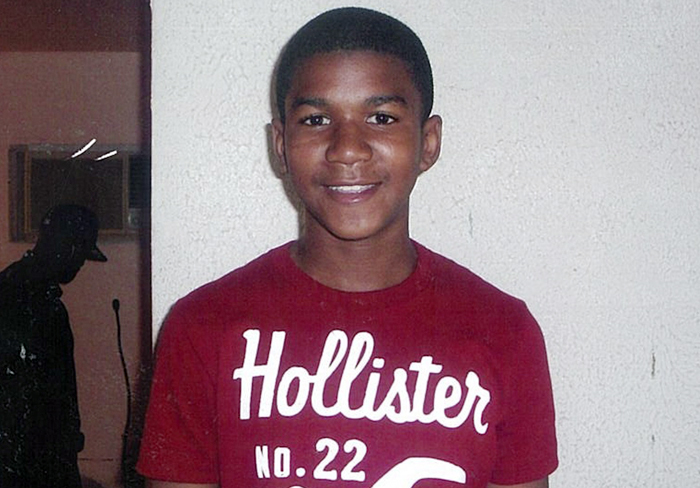
Feb. 26, 2012 Neighborhood watch volunteer George Zimmerman fatally shoots unarmed 17-yearold Trayvon Martin after an altercation in a Sanford, Fla., subdivision. The incident sparked a national conversation about race and prompted President Obama to say that were he to have a son, “he’d look like Trayvon.” Zimmerman, who argued that he acted in self-defense, was acquitted of second-degree murder and manslaughter in July 2013.
Ernest Satterwhite
Feb. 9, 2014 Ernest Satterwhite, 68, is shot and killed in his driveway by a white public-safety officer in North Augusta, S.C., following a slow-speed car chase. Justin Craven fired multiple rounds through the driver-side door of the vehicle. The officer alleges that Satterwhite reached for his weapon; Satterwhite’s family disputes the allegation. Craven was charged with a felony for discharging his gun into an occupied vehicle on April 7, the same day Michael Slager was charged with murdering Walter Scott. He faces up to 10 years in prison.
Dontre Hamilton
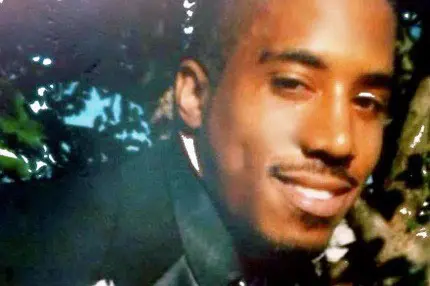
April 30, 2014 Milwaukee police officer Christopher Manney fatally shoots Dontre Hamilton, an unarmed 31-year-old African American with a history of mental illness, in a downtown park. Manney alleged that Hamilton, who appeared to be homeless, attempted to grab his baton during a pat down. Manney says he shot Hamilton 14 times in self-defense. Manney was fired in October but was not charged in the shooting.
Eric Garner
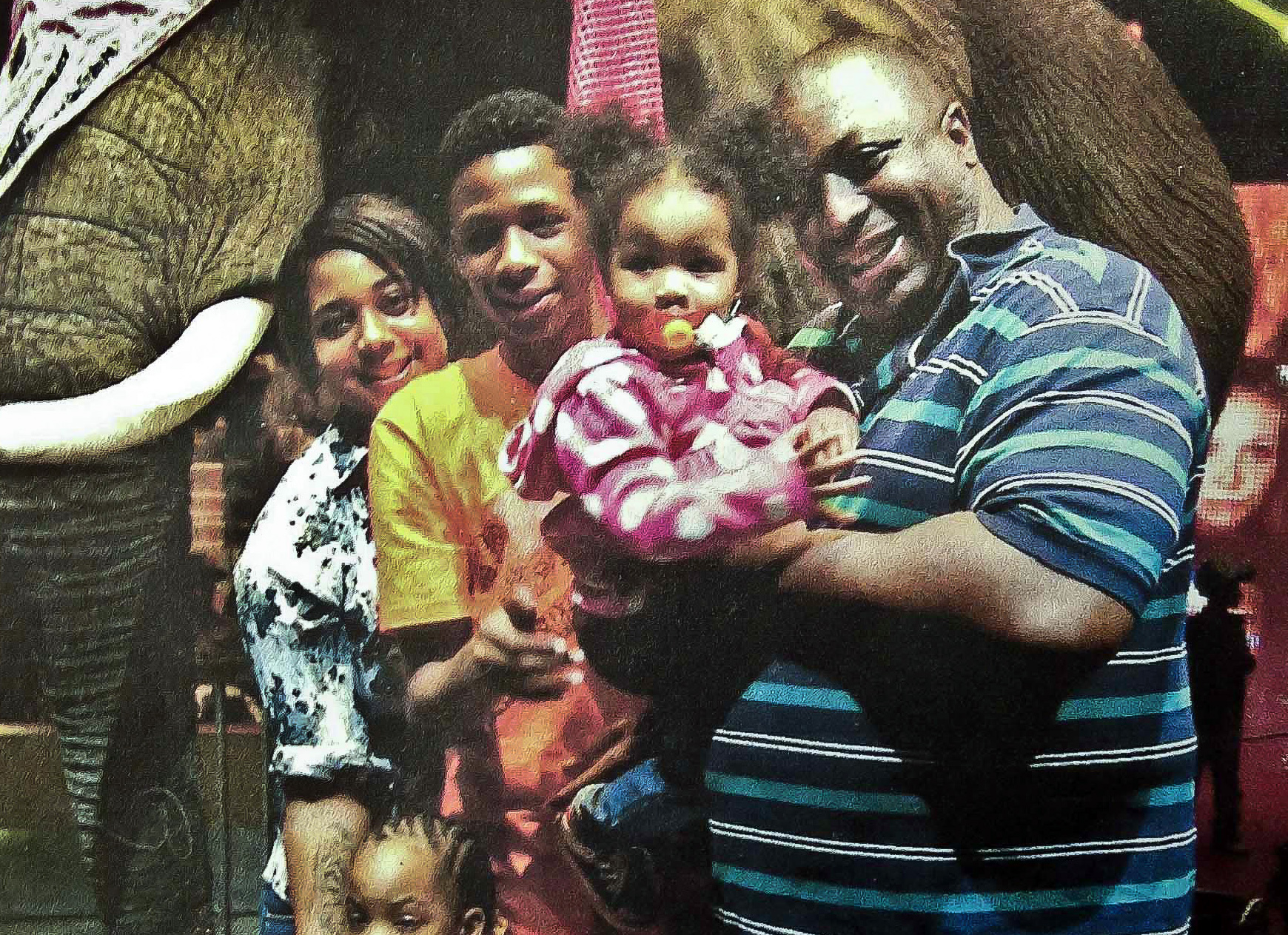
July 17, 2014 Eric Garner, 43, dies after being wrestled to the ground as New York City police attempted to arrest him for selling illegal cigarettes. In a cell-phone video recorded by a bystander, Garner can be heard repeatedly saying, “I can’t breathe.” The phrase was soon adopted as a rallying cry by protesters. On Dec. 3, a grand jury decided not to indict NYPD officer Daniel Pantaleo in Garner’s death.
John Crawford III
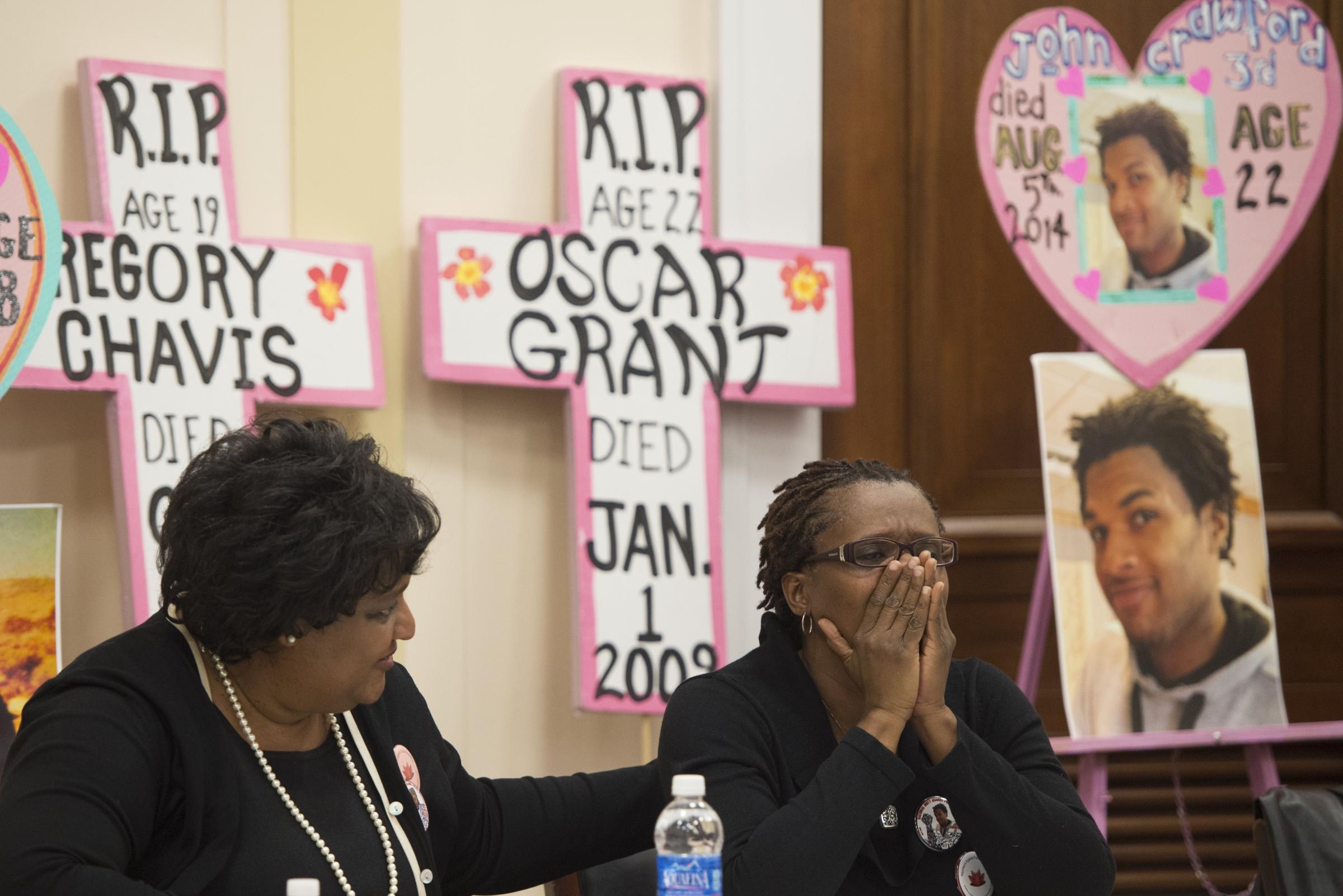
Aug. 5, 2014 John Crawford III, 22, is shot inside a Walmart in Beavercreek, Ohio, after picking up an air rifle from the shelf. While police say they repeatedly asked Crawford, who was black, to drop the gun, surveillance video shows that police shot the man soon after approaching him.
Michael Brown
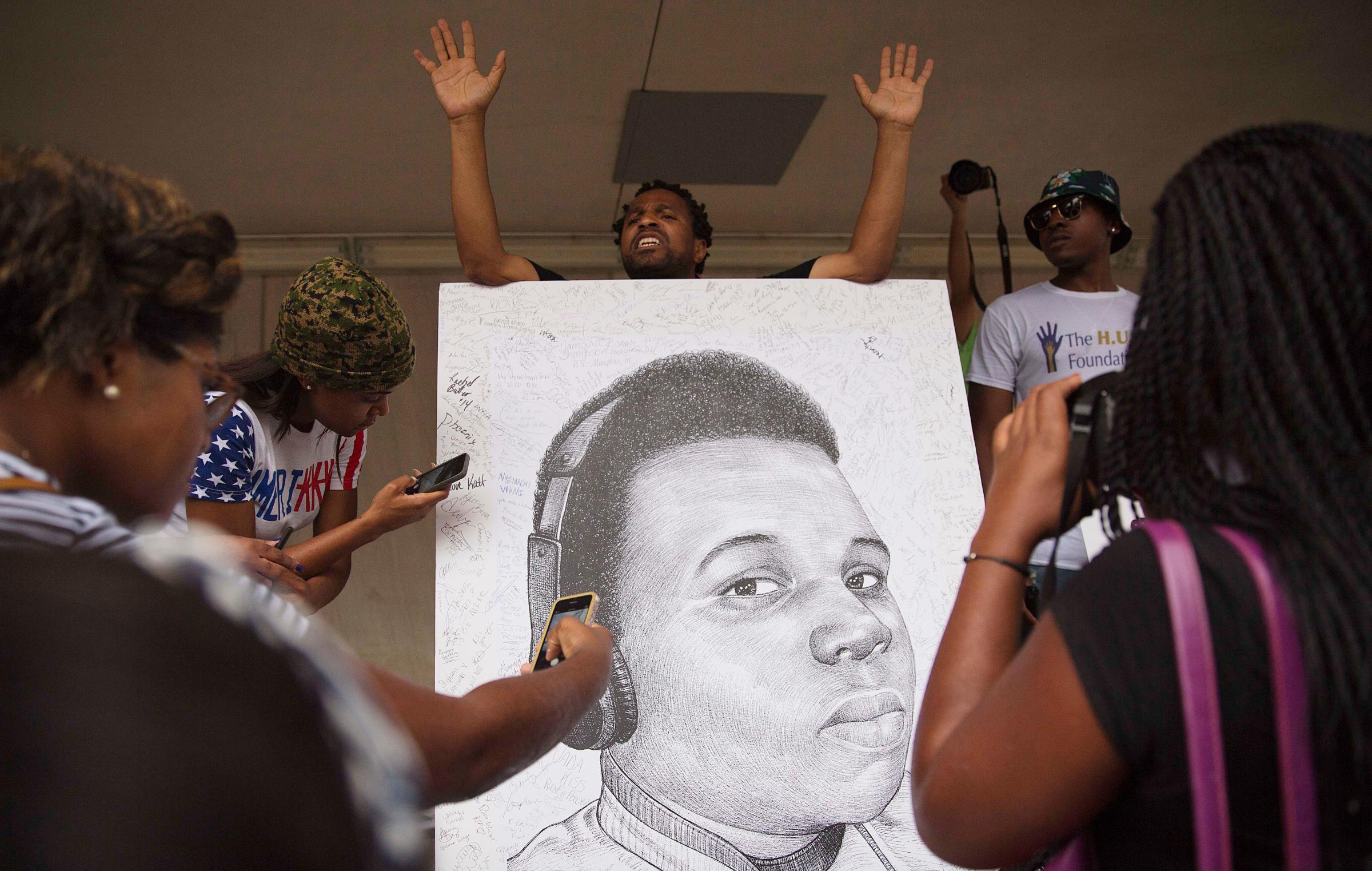
Aug. 9, 2014 Darren Wilson, a white Ferguson, Mo., police officer, fatally shoots unarmed 18-yearold Michael Brown, setting off months of unrest in the St. Louis area. Protests erupted nationwide in November, when Wilson was not indicted in Brown’s death. But the shooting prompted a Justice Department investigation of the Ferguson Police Department. In March, after the scathing report found instances of overt racism among officers and a pattern of arrests targeting black residents, Ferguson’s police chief and city manager resigned.
Levar Jones
Sept. 4, 2014 Levar Jones, 35, is shot multiple times by 31-year-old Sean Groubert, a white South Carolina state trooper, seconds after being stopped for a seat-belt violation, all of which was caught on the officer’s dash cam. Jones, who was black and unarmed, survived and can be heard on a video asking, “Why did you shoot me?” Groubert was later fired and charged with assault and battery, which carries a sentence of 20 years in prison. A verdict is expected later this year.
Tamir Rice
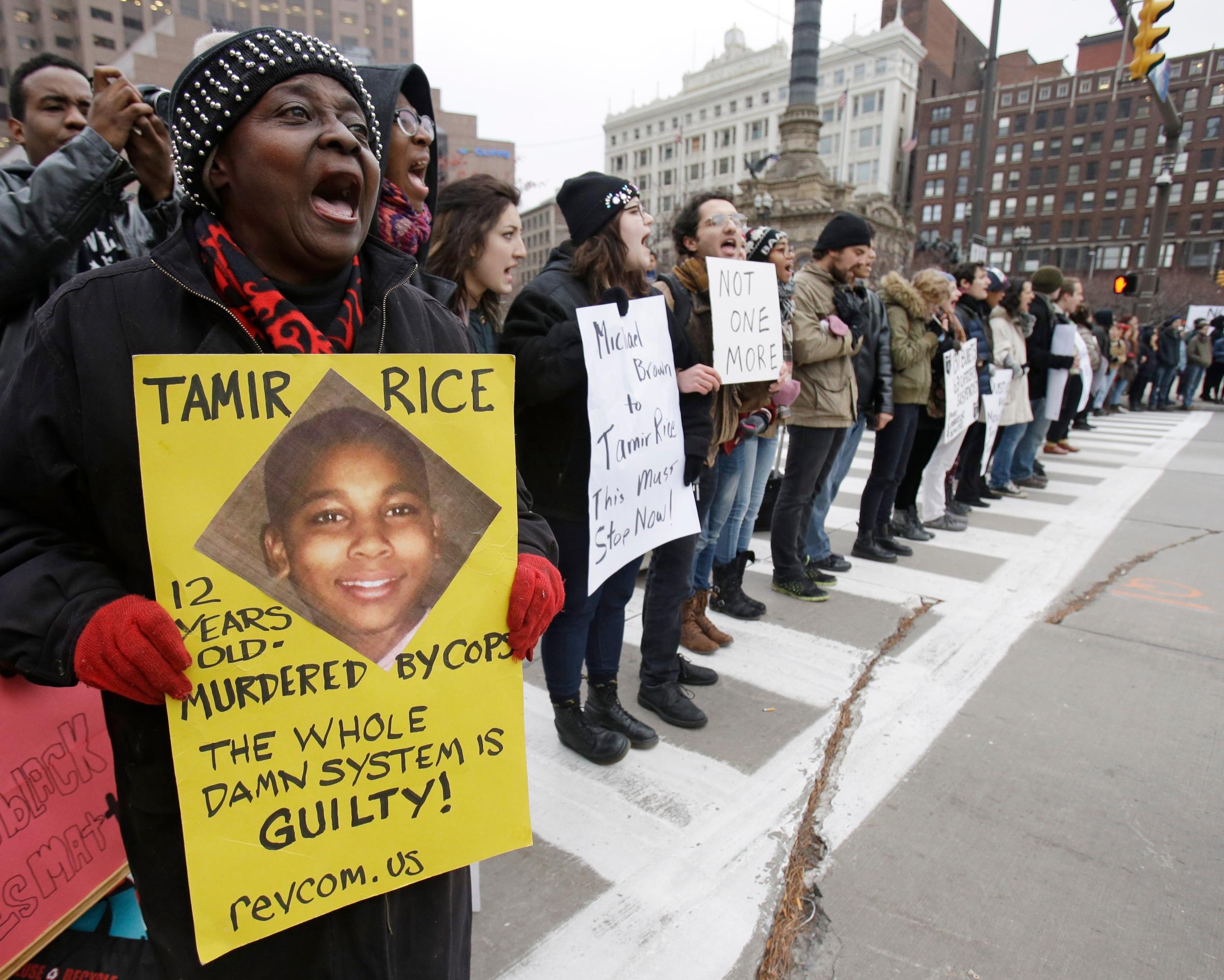
Nov. 22, 2014 Tamir Rice, 12, is fatally shot and killed in a Cleveland park after police responded to a 911 call reporting a person with a gun. The caller warned that the gun may have been fake, but the officers say they didn’t know that. Officer Timothy Loehmann shot Rice within seconds of arriving on the scene. Rice’s gun turned out to have been a toy. A group of political and religious leaders have called for criminal charges to be brought against the officers involved, and a grand jury plans to hear evidence in the case.
Rumain Brisbon
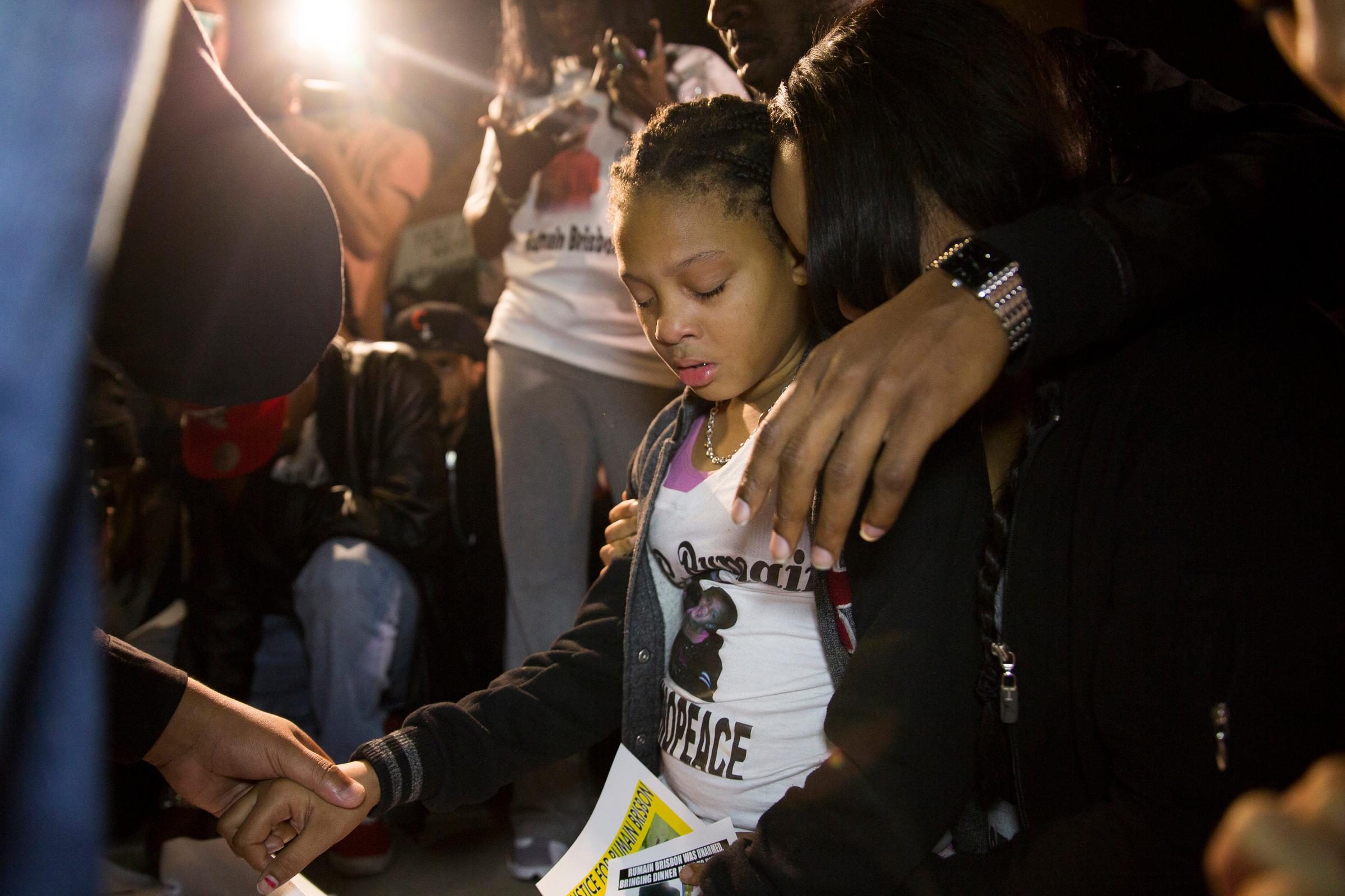
Dec. 2, 2014 Rumain Brisbon, 34, is shot and killed by a Phoenix police officer following a drug-related traffic stop in which Brisbon, who was black, fled, refused arrest and appeared to be reaching for a weapon. Brisbon was shot by Mark Rine, a 30-year-old white officer. The incident set off several demonstrations in downtown Phoenix. On April 1, a Maricopa County attorney announced that criminal charges would not be brought against Rine.
Charly “Africa” Leundeu Keunang
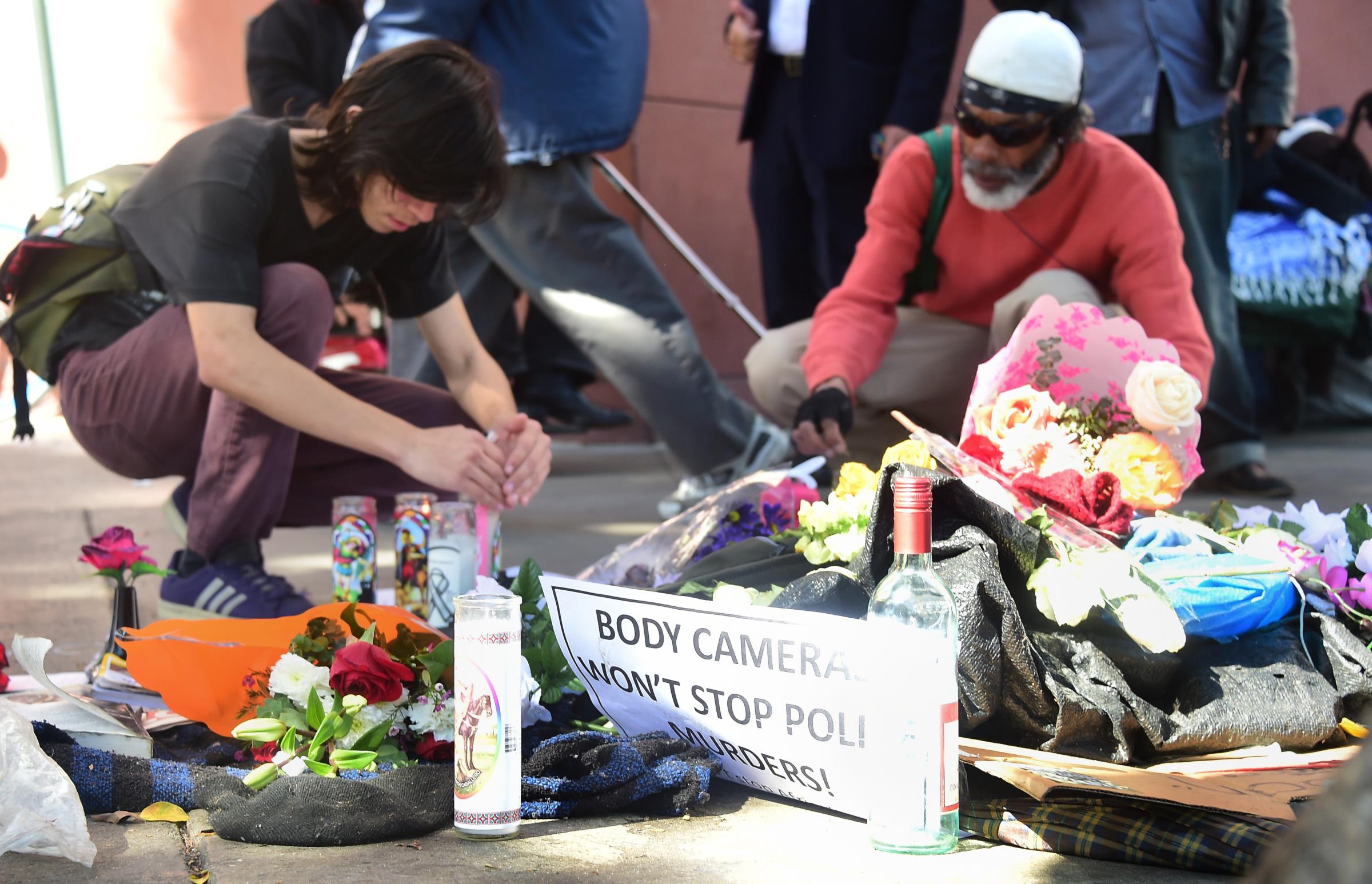
March 1, 2015 Los Angeles police officers shoot and kill a black homeless man named Charly “Africa” Leundeu Keunang, following a confrontation in the city’s Skid Row, an area with a heavy concentration of homeless people. Officers said the man attempted to take one of their guns.
Naeschylus Vinzant
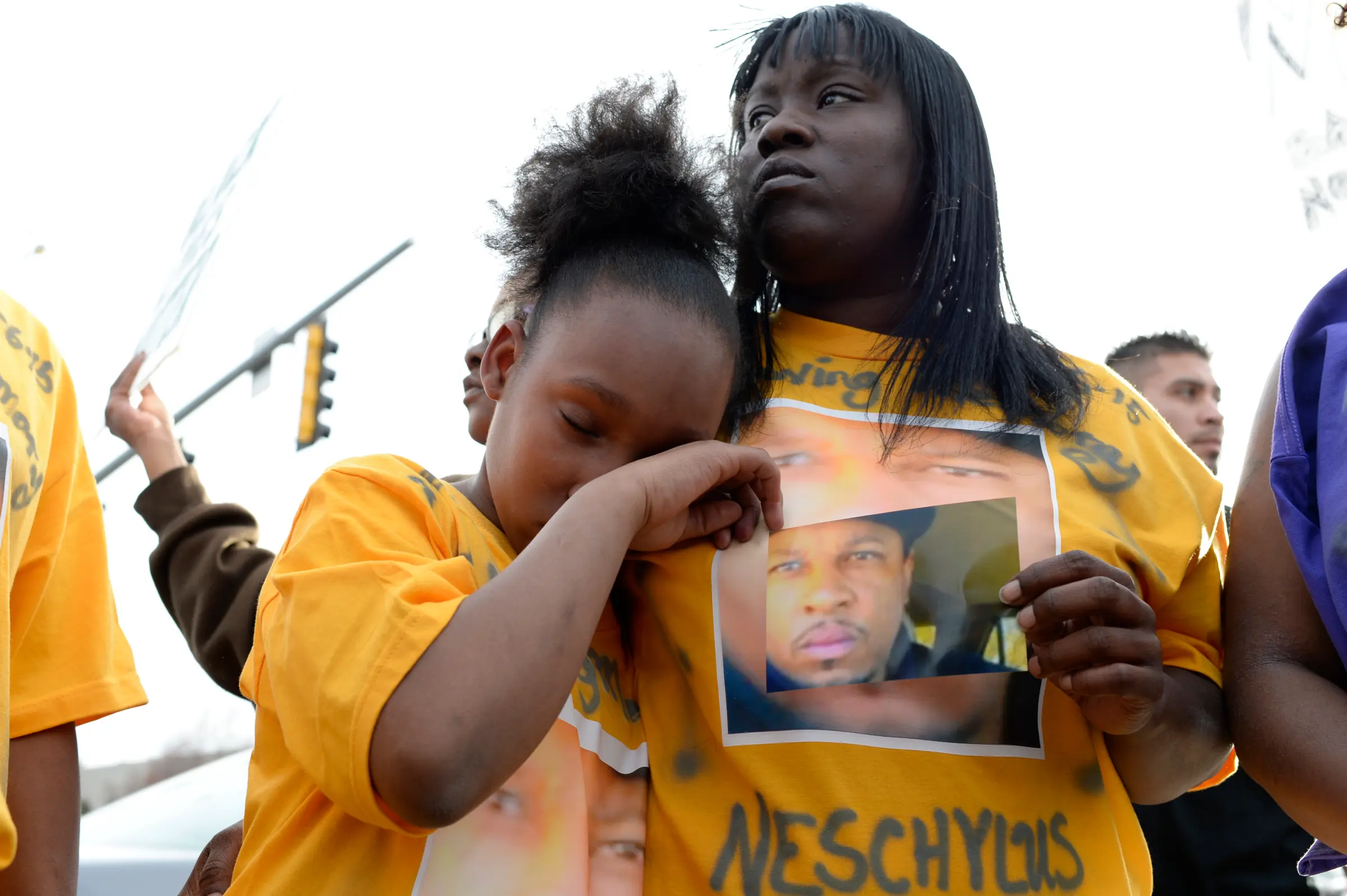
March 6, 2015 Naeschylus Vinzant, a 37-yearold unarmed black man, is shot in the chest and killed by Paul Jerothe, a police officer in Aurora, Colo. At the time of the shooting, Vinzant was violating his parole and had removed his ankle bracelet. He also had a violent criminal history but was unarmed as officers tried to arrest him. Jerothe, a SWAT team medic officer, has been placed on administrative leave pending an investigation.
Tony Robinson
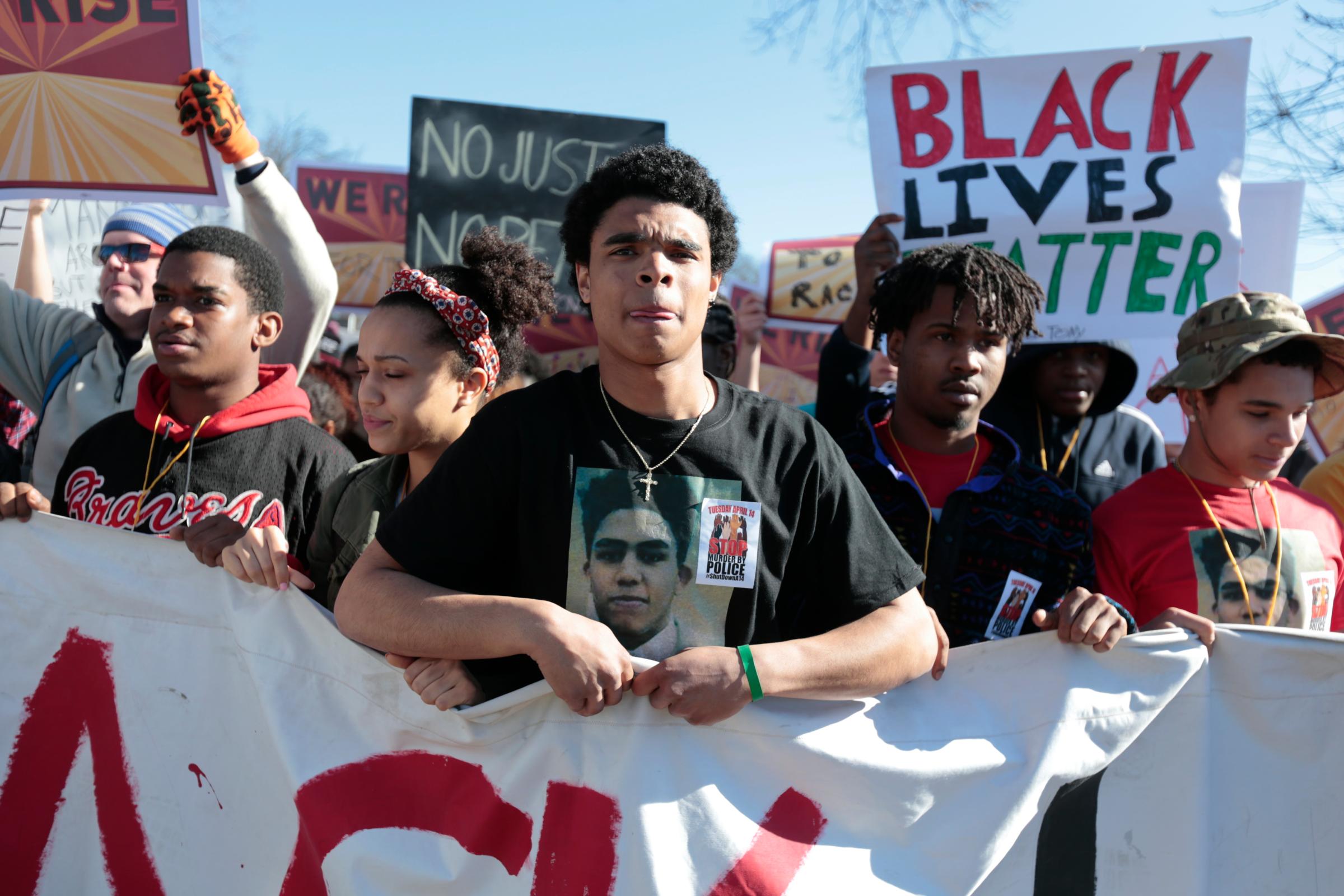
March 6, 2015 Tony Robinson, a 19-year-old biracial man, is shot by a white Madison, Wis., police officer after Robinson was allegedly jumping in and out of traffic. Matt Kenny, a 45-year-old officer who was exonerated in a 2007 shooting of an African-American man, got into an altercation with Robinson when he entered an apartment in which Robinson was reportedly acting aggressively. Kenny, who says he was attacked by Robinson, was placed on administrative leave with pay pending the results of an investigation.
Anthony Hill

March 9, 2015 Anthony Hill, a black 27-yearold Air Force veteran, is shot and killed in Chamblee, Ga., by Robert Olsen, a white DeKalb County Police Department officer. Hill was naked and unarmed at the time of the incident and was apparently knocking on multiple apartment doors inside a housing complex. Olsen has been placed on leave. An investigation by the Georgia Bureau of Investigation is currently under way.
Walter Scott
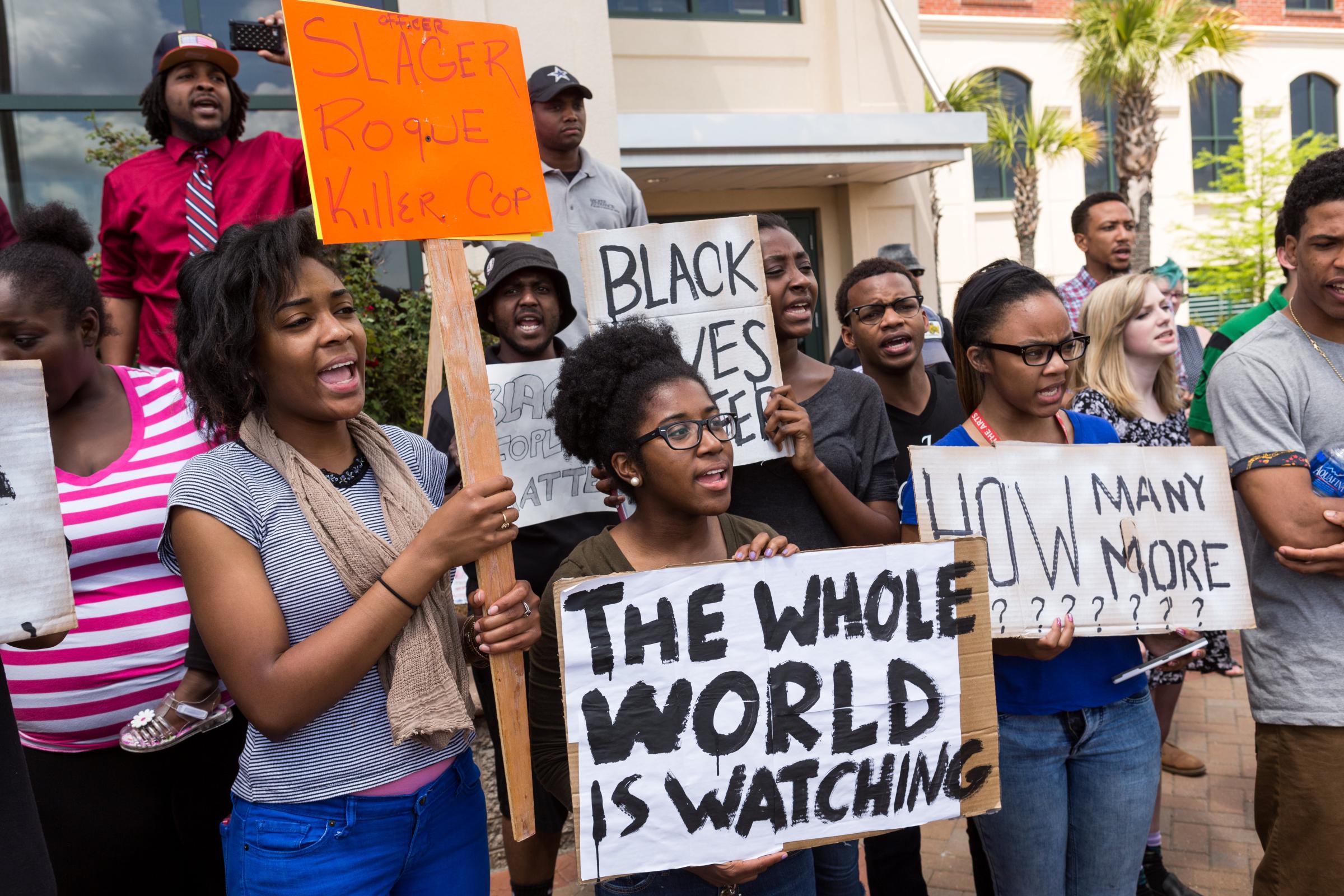
April 4, 2015 Walter Scott, a 50-year-old black man, is shot and killed as he’s apparently fleeing North Charleston officer Michael Slager, 33. Slager, who is white, alleges that Scott reached for his Taser. A video recorded by a bystander appears to show Scott running away from the officer as he’s shot in the back eight times.
More Must-Reads from TIME
- Caitlin Clark Is TIME's 2024 Athlete of the Year
- Where Trump 2.0 Will Differ From 1.0
- Is Intermittent Fasting Good or Bad for You?
- The 100 Must-Read Books of 2024
- Column: If Optimism Feels Ridiculous Now, Try Hope
- The Future of Climate Action Is Trade Policy
- FX’s Say Nothing Is the Must-Watch Political Thriller of 2024
- Merle Bombardieri Is Helping People Make the Baby Decision
Contact us at letters@time.com